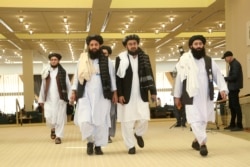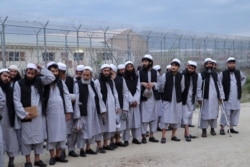Afghanistan’s government announced Monday it will not release 600 prisoners out of a list of 5,000 the Taliban wants freed as a prerequisite to starting negotiations with other Afghan groups on reaching a political settlement to end decades of conflict.
Sediq Sediqi, the spokesman for President Ashraf Ghani, said during a press conference in Kabul that these particular prisoners were arrested due to their involvement in various criminal activities, not their affiliation with the Taliban. Other Afghan officials have described these prisoners as criminals involved in armed robberies, murder, corruption and drug smuggling.
Sediqi said a deal between the Taliban and United States in February stipulated releasing up to 5,000 Taliban prisoners but did not specify which ones to let go.
The landmark agreement paved the way for the U.S. to start withdrawing its forces from Afghanistan, a country where it has fought its longest-ever war since 2001.
The agreement mentioned the release of prisoners from both sides, namely, up to 1,000 Afghan security forces’ members being held by the Taliban and up to 5,000 Taliban militants held by the government.
While the Afghan government considered prisoner release as a work in progress that could continue while negotiations progressed, the Taliban insisted on it as a pre-requisite, thereby delaying a start to the process.
After a recent meeting between the head of the Taliban negotiation team, Mullah Abdul Ghani Baradar, and Muhammad Ibrahim Tahiryan, Iran’s special representative for Afghanistan, the Taliban spokesman reiterated their position.
“Regarding intra-Afghan negotiations, Mullah Baradar said, we are committed to all provisions of the Agreement. Whenever our prisoners’ release is completed, we are ready for commencement of the intra-Afghan negotiations,” Suhail Shaheen tweeted.
Sediqi, however, said the government has already released 4,015 Taliban prisoners and accused the militant group of causing the delay by not reciprocating.
Taliban spokesman Shaheen said they have released 737 Afghan security personnel out of the list of 1,000. The Afghan government disputes these figures, saying many of the released are civilians.
Similarly, the Taliban has rejected the government numbers. The group says only 3,500 Taliban have been released so far.
Still, a Taliban team is in Kabul to work with the government on identifying their prisoners.
The first round of intra-Afghan negotiations was supposed to be held in Doha this month, but a date has not yet been announced. Doha is where a U.S. team, led by the special representative for Afghanistan Reconciliation, Zalmay Khalilzad, negotiated with the Taliban for almost a year-and-a-half, culminating in a deal signed earlier in 2020.
Since the deal, the Taliban have stopped attacking American and NATO forces directly but have not held back on targeting Afghan personnel.
The international community has repeatedly urged the Taliban to keep the violence level low, fearing a breakdown in the tenuous process.






